Contact us today for your Free Quote
It is estimated that the UK generated 40.4 million tonnes of commercial and industrial waste in 2020. What’s the best way to bin your waste until collection?
Bins might not seem like the most exciting topic, but they’re actually essential for businesses of all sizes. Without bins, businesses would quickly become overwhelmed with waste, leading to all sorts of problems.
Whether you’re a small local pub or the largest office facility in the centre of town, bins are essential to store your waste, keeping your business clean and tidy.
‘But hold on a minute, how do I know which bin is right for me?’
To answer this, we wrote this article to give you insight into what types of bins, containers and related services are available for your business.
Commercial Bins vs Residential Bins: What’s the Difference
Size and Variety: Firstly, commercial bins can come in a much wider variety of designs and sizes compared to smaller residential wheelie bins. This is because businesses produce more waste, and also due to certain sectors regularly producing specific types of waste such as construction and hazardous waste, which is unusual for a typical household.
Add-On Bin Features: Commercial bins can come with enhanced features to suit a business’s needs. From lockable lids for confidential waste to specialised bin liners to suit specific waste types, there are a variety of add-ons available to complement a bin container.
Advanced Equipment: If bin containers aren’t enough, waste companies can also provide advanced equipment options, acting as part of a business’s wider bin and waste management system. For example, if your business produces a large amount of waste, compactor hires are available to compress the waste stream, condensing it for space efficiency and reduced collections.
Understanding Your Business’s Needs: Commercial Bin Size & Type
When it comes to picking the right bin option for you, there are some key factors that you may want to consider…
- Waste Volume: The first thing you want to factor in is how much waste your business creates on a regular basis. While assessing this, you may also want to account for peak periods, as well as whether this is going to increase or decrease in the future.
- Collection Frequencies: In relation, the amount of waste and the space you have to store it ultimately also affects the collection frequency you may need.
- Waste Type: Key reasons you may want to consider other waste streams include compliance, environmental protection and expert processing. If you produce certain regulated waste, such as batteries and clinical waste, you may want to dispose of these items with properly accredited service providers. To find out more about this, we have a dedicated section regarding legislation on our website to inform businesses to ensure their compliance.
Types of Commercial Bins & Containers
As mentioned, commercial bins may vary widely in size and design depending on their purpose. These include everything from your typical household bins to large-scale industrial waste containers, each designed for specific purposes and spaces:
Wheelie Bins: Wheelie bins are among the most common types of commercial waste containers. As the name suggests, they are characterised by their wheels. A common size of wheelie bin used by councils is 240L, however, they can vary in size from 120L to 1100L. Moreover, their weight limits can vary from 10kg to over 65kg, depending on the waste stream.
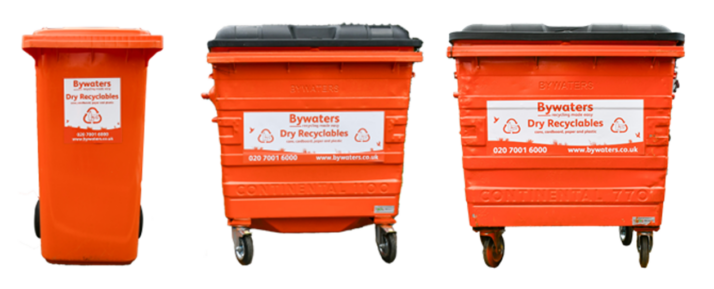
Skips: From overhauling your office to dealing with house renovations, skips offer a simple and efficient solution for managing large amounts of waste. They are often used for construction and demolition waste. Most kinds of skips can be a cost-effective way to store waste and reduce the frequency of collections, which can save you money on disposal costs.
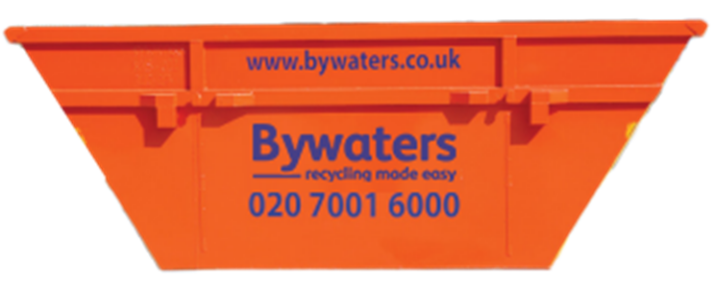
Rear End Loader Skips: Rear end loader skips (otherwise known as REL skips or RELs) are defined by their secure lid to help prevent damage, theft or contamination. As with most other types of skips, they are ideal for businesses that produce large amounts of waste.
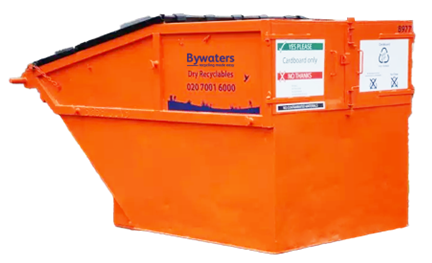
Roll On Roll Off Skips: Roll on roll off skips (otherwise known as RoRos or Roll On Offs) are typically larger than your usual skip, often being suitable for larger commercial jobs. Their name comes from the way they are collected, instead of being lifted like a traditional skip, they are rolled onto and off of a rubbish lorry for more seamless collections.
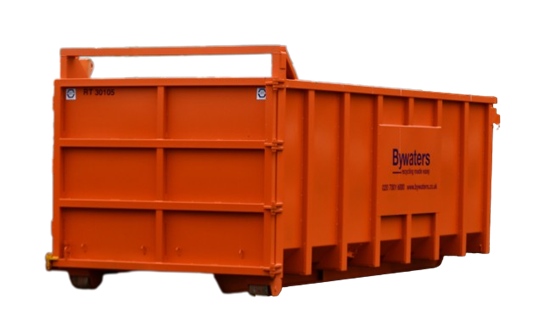
Compactors: While they aren’t technically bins, compactors are the perfect solution for any business that produces large amounts of waste, while saving on storage space.
A compactor uses a hydraulic metal ram at the top to compress waste. After loading and securing the compactor, the operator can activate the ram, starting the compacting process. Most materials can be compacted but with some exceptions.
It compresses your waste into a smaller volume, reducing the amount of collections needed, seamlessly saving you time and money, as well as reducing your business’s carbon footprint.
Bywaters provides one of the widest ranges of compactors in the UK, for all types of businesses, no matter how big or small. Visit our compactors section to learn more about our standard range. If you are looking for equipment specific to your needs, contact us today to consult with experts on your needs.
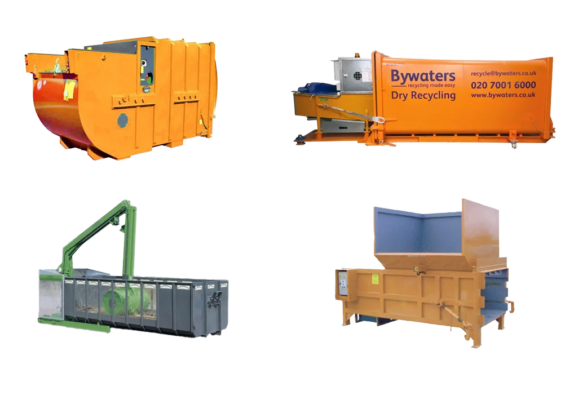
Conclusion
We hope this guide has helped you understand the best use of different containers available to your business. By considering the factors and options discussed, you can choose the right bin solution to meet your specific needs.
If you have any questions or have waste that needs to be collected, contact us today.
Moreover, if you’re interested in finding out more about what happens to individual waste streams after collection with recyclers like Bywaters, click here.


